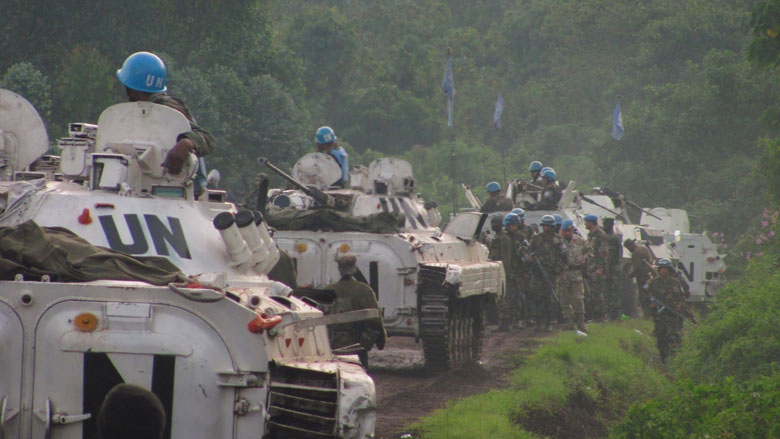The BLOG: Politics and Law
MONUSCO mandate renewed: An encouraging decision, but room for improvement
Joseph Nguramo | April 1, 2016

MONUSCO peacekeepers (Courtesy of Wikimedia)
It was with great relief that many Congolese, including those victimized by human right violations and concerned about the uncertainty of the upcoming presidential elections, heard the news on March 30 of the United Nations Security Council extending the MONUSCO — the United Nations Organization Stabilization Mission in the Democratic Republic of the Congo — mandate for a year, until March 2017. Prolonging the UN mandate may be contrary to what the Congolese government is advocating – the reduction of UN troops. Yet this decision is reasonable, practical and wise in light of the continual failure of the Congolese leadership to secure its people, particularly in the eastern part of the DRC, and the violent fallout looming from the current Congolese government’s failure to organize timely presidential elections. The prospect of seeing President Joseph Kabila’s government defy the constitutional bar on a third term, and cling to power, has raised tensions among all layers of the Congolese civil and political society, and perplexed the international community. UNSC’s extension of the MONUSCO mandate is welcome news: The presence of peace-keeping forces will act as a deterrent to the inevitable violence moving forward, and continue to assist the Congolese government in providing security and restoring order in the country.
While extending the MONUSCO mandate is a vital step to kindling hope for the DRC and millions of Congolese, the UN might look to its past experiences in the Congo, and other places such as Rwanda and Kosovo. Ideally, MONUSCO’s mandate is to support Congolese efforts. Given the mediocre performance and apathy of the Congolese government to protect its people, mainly in the Kivu, the MONUSCO could have been advised and allowed the more proactive mandate of seizing initiative where the Congolese leadership has failed. Passing resolutions that are inadequately implemented is not enough. It is also illogical to repeat the same actions, when the actions do not yield substantial progress. Repeatedly, the UN has raised alarms against insecurity in the Kivu, where women and children have been the first victims of the Congolese civil war. Repeatedly, nothing concrete has been achieved. Addressing these past patterns would help the UN protect its reputation and credibility. The recent report on the ongoing horrendous civilian massacre in Beni — from the Congo Research Group at New York University — shows a spectacularly pedestrian performance by the UN force in securing the civilian population. This disturbing incident further argues for the UN to substantially revise its policy and approach for future engagements in the region.
The general reality is that many Congolese people are in favor of the presence of MONUSCO and praise their work. By and large, the UN forces have engaged in positive and varied ways over the past decade — from supporting the Congolese government, securing the peace and protecting civilian population, not to mention their substantial contribution to local and national economic development. The UN should capitalize on the ensuing support of these successes to implement its policies more aggressively, particularly as the Congolese government has failed to protect its people in the Kivu. Inaction and passivity will not be helpful — and indeed be counterproductive — in averting further bloodshed from the inevitable violence if presidential elections are not held this November.
This would not be the first time in Congolese history that the UN has taken the lead in implementing a decision that has saved innocent lives and yielded concrete results for the young nation of the DRC. In the 1960s, the UN helped the inefficient central government in Kinshasa to quell the Katangese secession — a feat impossible without UN support. Sixty years later, the UN, through the Tanzanian Intervention Brigade, defeated the M23 — a continuation of the former rebel movement CNDP. While relying on the Congolese army — at the front may have seemed ideal, it would not have been a prudent policy at this time. Since Congolese independence in 1960, this army has been an element of terror, shame, predation, intimidation, rape, pillage and massive human rights violence against both the Congolese people and foreigners. It is important to highlight that they are outstanding Congolese soldiers — they are unpaid, under equipped, misled, but always ready and eager to answer the call to serve their country. It is a failure and betrayal of their leadership — particularly a leadership of character from the top down — that has exacerbated the problem. It has encouraged and tolerated indiscipline, disorder and corruption to reign in the army. The Congolese leadership has failed to build an educated and professional army corps of officers and non-commissioned officers, who are committed to being a source of inspiration to all Congolese, through honorable service to their country. Instead of being a beacon of hope and inspiration, the Congolese perception of joining the army is the equivalent of a nightmare of embracing eternal misery.
This situation can be reversed and fixed. All it takes is a relentless commitment to a leadership of character, to steer these Congolese men and women through motivation and inspiration towards a prouder legacy. The recent efforts — since 2003 — of the European Union and International Community to reform the Congolese army have proven to be unsuccessful, despite the hundreds of millions of dollars poured into this project from bilateral and multilateral donors. If anything, the solution would be to disband the Congolese army/FARDC and rebuild it from the ground up. Such a move would be welcomed by the Congolese people — the primary victims of the indiscipline, predatory and unprofessional behavior of the Congolese army. Until then, the MONUSCO should assume the pole position in securing the civilian population, and continue to assist both the Congolese government and army where they have failed. Removing the UN forces, even in the next two years, is and will be a premature decision. The performance of the Congolese leadership to date does not give reason to hope for improvement in the near future.

Joseph Nguramo
Joseph Nguramo is a Congolese native who graduated from West Point Military Academy in 2014. He now lives in Washington, D.C., and is pursuing graduate studies.






